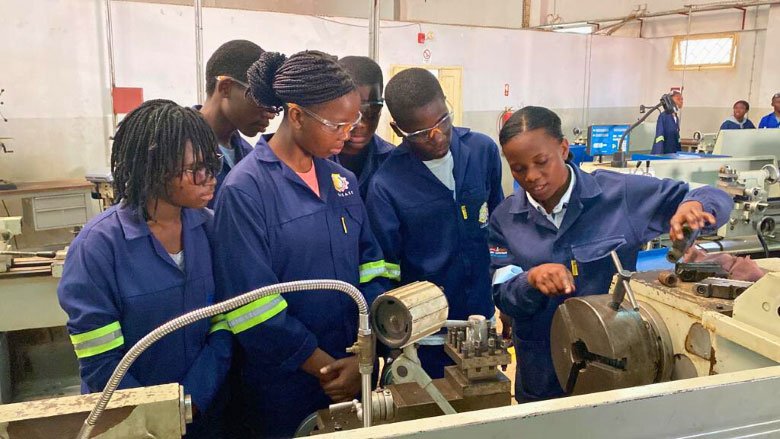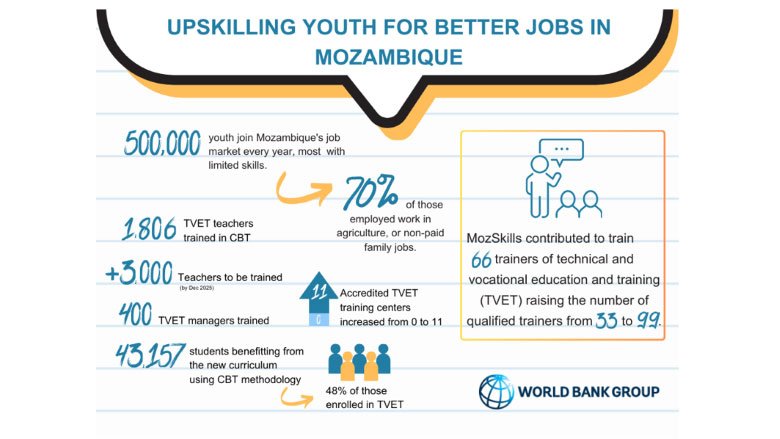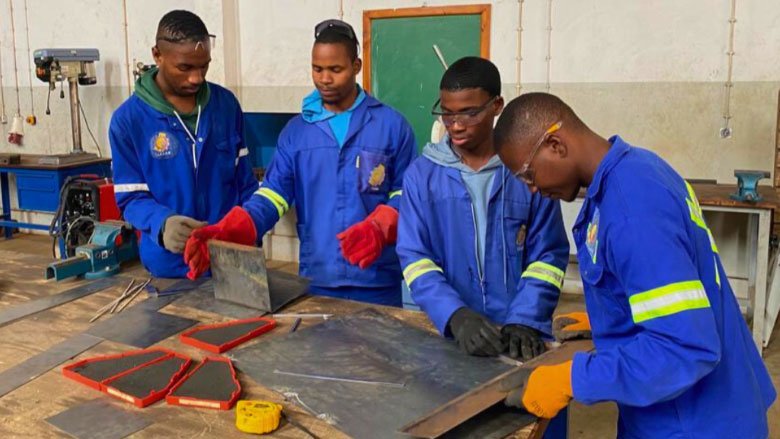Aurora Miranda is a young woman on a mission: connecting homes in her community to the power grid.
When she joined the Industrial Electronics vocational course at Instituto Médio Salesiano de Inharrime in Inhambane Province, Central Mozambique, she had little more than general knowledge and a vague idea about what to do with her future. In the course, she learned practical skills to become an electrician and plans to be self-employed.
“I want to solve problems in my community, like maintaining electric systems and connecting houses to the grid,” says Aurora. “I learned that I could run my own business!”
Aurora is among the over 43,000 students benefitting from a new competency-based curriculum transforming Mozambique’s technical and vocational education and training (TVET) system, with support from the World Bank’s fund for the poorest, the International Development Association. The new curriculum helps students learn the practical skills they need for their jobs. It also teaches them how to solve problems and develop a good work ethic. After all, this is what they need in today’s job market.
Mass-training teachers to upskill youth
Mozambique faces the pressing challenge of equipping its young and rapidly growing population with quality education and technical skills. With half a million youth entering the job market each year, most with limited skills[RS1] , there is an urgent need to provide them with the training necessary to access good jobs and wages. Over 70% of Mozambicans currently employed work in agriculture or non-paid family jobs. The country’s economy and job market need more professionals with specialized knowledge and technical skills, particularly those in fields like Science, Technology, Engineering, and Math (STEM).
To address this skills gap, Mozambique has been working with the World Bank's and partners' support to professionalize its educators. The goal is to enhance teaching and practical skills, ultimately bridging the gap between the skills demanded by the job market and those possessed by the country's youth.
“The great impact [of the new curriculum] is providing students with practical skills that enable them to pursue self-employment and succeed in the job market,” says Celso Rafael, a business management teacher and manager at Instituto Industrial e Comercial Estrela do Mar in Inhambane Province, who has trained over 800 students.
“We are shaping lives,” says Celso. “We are contributing to changing people, families, and the country, and I think this is priceless,” he adds.
Upgrading the entire system
To make systemic change, the country needed enough teachers in higher education institutions trained in the competency-based training curriculum to ensure that there are enough accredited institutions capable of providing this training. The Improvement of Skills Development Project (MozSkills) is helping achieve this.
MozSkills is helping to improve the quality of higher education and TVET by training more teachers and managers on the new curriculum, with a strong focus on practical skills and STEM subjects. The project has successfully trained 66 trainers on Competency-Based Training methodologies (CBT) and enabled the accreditation of ten higher education institutions to carry on the training of TVET teachers and managers, allowing them to reach professional certification and potentially scaling up its impact.
“Training managers and teachers have challenged us to shift from assessing students based on written exams to a skills-based approach that evaluates students’ knowledge, performance, and productivity,” said Mr. Nhampossa, Coordinator at the Universidade Save’s Technical-Professional Teaching Centre, one of the ten accredited institutions.
Better skills for better jobs
Ivan Massango, a young man from central Mozambique, always wanted to be a professional builder but lacked the skills. “This is why I enrolled in the Civil Construction vocational course. I needed to learn practical skills to become self-employed,” he says. For Ivan, vocational training is the basis for success since it teaches theory and practice. “I had no skills when I joined. Today, I have a vision and a plan. I have formed a team of six qualified builders to work with me.”
The new curriculum promotes upskilling for self-employment and motivates teachers and managers to deliver quality training as they see students succeeding in new jobs and starting their own businesses.
“Every day, I teach future workers who arrive with no experience and become excellent professionals. As a teacher, it is gratifying to send a student for an internship with a company and to learn that the company employed them, and this happens often,” says Celso.
“Now, we teach how to do, be, and behave. When teachers feel confident in what they teach, they deliver high-quality training. The result is highly qualified technicians to supply to our job market,” says Telma Inácio, who teaches mechanics at Maputo’s Industrial and Computing Institute.
More teachers, and better-trained teachers, mean that youth are better prepared with the skills needed to access better jobs and wages. To date, 1,806 teachers have received professional certification in competency-based training, and 400 staff (teachers and TVET school managers) completed the certification in management. Over a thousand more teachers are currently in training. By the end of the project in December 2025, Mozambique will have over 3,000 teachers ready to build a qualified and capable generation. Approximately 43,000 students now benefit from high-quality instruction provided by these well-trained teachers, with an uptick in female enrollment – a key priority for the project.
"We need to tell girls that vocational training is not just for men. Women can do anything, and anything is possible!” adds Aurora.



